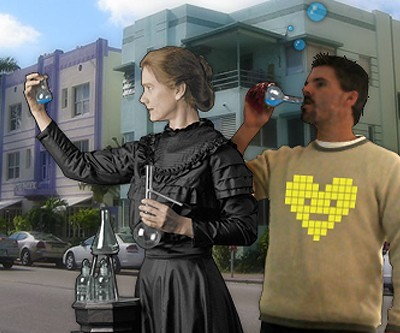Editor's Note: On his way down to Miami to see Art Basel, Derek Gores stopped at a sketchy roadside Cuban food cart and consumed a highly suspect medianoche sandwich. The spoiled meat caused a rift in the fabric of space and time. Well, now that we've explained the science, please enjoy another exclusive interview.
I saw famed chemist and physicist Madame Marie Curie while waiting at a crosswalk on Collins Ave in South Beach last week, with a big collage in my hands, around 10pm Thursday. I'm pretty sure it was her. I should have checked her identity on her library card. She doesn't strike me as a pay-full-new-book-price-when-u-order-it-brand-new-on-amazon kind of gal.
Derek Gores: Madame Curie! Curious running into you here at the nation's largest art fair!
Madame Curie: Be less curious about people and more curious about ideas.
DG: You like contemporary art, or more the traditional stuff?
MC: I am one of those who think like Nobel, that humanity will draw more good than evil from new discoveries. Nothing in life is to be feared, it is only to be understood. Now is the time to understand more, so that we may fear less.
DG: Uh huh. Of the shows I saw here, I was most thrilled by Aqua, then Art Basel, then those crazy Primary Flight graffiti stars, less so by Red Dot Miami. What kind of beauty gets you going?
MC: I am among those who think that science has great beauty. A scientist in his laboratory is not only a technician: he is also a child placed before natural phenomena which impress him like a fairy tale. There are sadistic scientists who hurry to hunt down errors instead of establishing the truth.
DG: Of course food can be art too. Ever had the BLGT sandwich at Proof, in the Z Ocean hotel? Now that is how a sandwich is done.
MC: One never notices what has been done; one can only see what remains to be done.
DG: You didn't ask of course, but I had a little show there at the Z Ocean, in the wine room. Not quite Art Basel, but fun. Did you see?
MC: We must have perseverance and above all confidence in ourselves. We must believe that we are gifted for something and that this thing must be attained.
DG: True story. People wear some crazy stuff around here. Are you a fashionista?
MC: I have no dress except the one I wear every day. If you are going to be kind enough to give me one, please let it be practical and dark so that I can put it on afterwards to go to the laboratory.
DG: Oh, K. Have you done much walking while here in Miami? I enjoy all the different hotel spaces. Favorite is the Delano... though I bet I'll love the W too. Those spots really play with your senses, high ceilings, RGB lights, slo motion drapery flowing... little shots of organica in the form of soft grass or creeping twigs or walls of water... combined with the sleek architecture makes for a dreamlike space. NOT TO MENTION all that pulsing music. (Ed. Note: bet she has Chemical Brothers on her ipod) You have any places that get you like that?
MC: All my life through, the new sights of Nature made me rejoice like a child.
DG: I hear you created a theory of radioactivity, and even coined that phrase. I haven't coined any phrases, though I use the word 'stuff' quite a bit. I also enjoy adding suffixes where they don't belong. But I'm guessing by radioactivity you don't mean anything with Miami's neon signs, right?
MC: I was taught that the way of progress is neither swift nor easy.We must not forget that when radium was discovered no one knew that it would prove useful in hospitals. The work was one of pure science. And this is a proof that scientific work must not be considered from the point of view of the direct usefulness of it. It must be done for itself, for the beauty of science, and then there is always the chance that a scientific discovery may become like the radium a benefit for humanity.
DG: Even at this huge art fair, I loved being reminded that the simple gestural art is often the most moving. And that gallery owners are just regular people, in love with the art from a different point in the process, and eager to share it with the world.
MC: Humanity needs practical men, who get the most out of their work, and, without forgetting the general good, safeguard their own interests. But humanity also needs dreamers, for whom the disinterested development of an enterprise is so captivating that it becomes impossible for them to devote their care to their own material profit. Without doubt, these dreamers do not deserve wealth, because they do not desire it.
DG: Looking back, you must wish now you had trademarked 'Radioactivity' as some kind of DJ handle. Any pros or cons about being called Madame?
MC:I have frequently been questioned, especially by women, of how I could reconcile family life with a scientific career. Well, it has not been easy.
DG: Thanks for your time Miss C, not to mention all that isotope and neoplasm stuff you did through the years. Any advice for the budding physicists and chemists out there?
MC:You cannot hope to build a better world without improving the individuals. To that end each of us must work for his own improvement, and at the same time share a general responsibility for all humanity, our particular duty being to aid those to whom we think we can be most useful.

